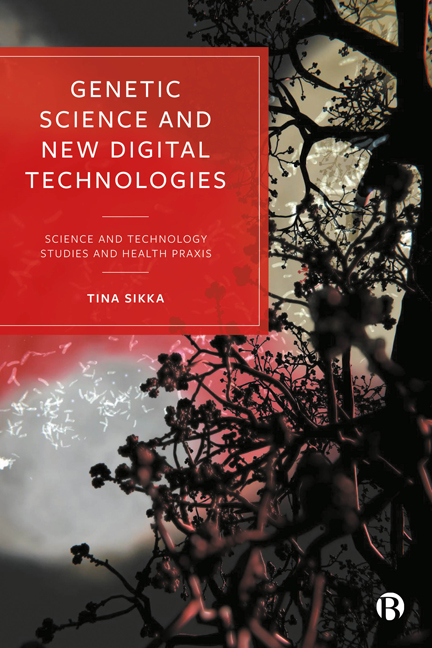Book contents
- Frontmatter
- Contents
- Notes on Contributors
- Introduction
- 1 Social and Behavioural Genomics and the Ethics of (In)Visibility
- 2 PureHealth: Feminist New Materialism, Posthuman Auto-Ethnography and Hegemonic Health Assemblages
- 3 Ambivalent Embodiment and HIV Treatment in South Africa
- 4 An ‘Artificial’ Concept as the Opposite of Human Dignity
- 5 Health Praxis in the Age of Artificial Intelligence: Diagnostics, Caregiving and Reimagining the Role(s) of Healthcare Practitioners
- 6 Digital Health Technological Advancements and Gender Dynamics in STS
- 7 Automation in Medical Imaging: Who Gets What AI Sees? Insights from the Adopters’ Perspective
- 8 Robots for Care: A Few Considerations from the Social Sciences
- 9 Are Ovulation Biosensors Feminist Technologies?
- Conclusion
- Index
6 - Digital Health Technological Advancements and Gender Dynamics in STS
Published online by Cambridge University Press: 28 March 2024
- Frontmatter
- Contents
- Notes on Contributors
- Introduction
- 1 Social and Behavioural Genomics and the Ethics of (In)Visibility
- 2 PureHealth: Feminist New Materialism, Posthuman Auto-Ethnography and Hegemonic Health Assemblages
- 3 Ambivalent Embodiment and HIV Treatment in South Africa
- 4 An ‘Artificial’ Concept as the Opposite of Human Dignity
- 5 Health Praxis in the Age of Artificial Intelligence: Diagnostics, Caregiving and Reimagining the Role(s) of Healthcare Practitioners
- 6 Digital Health Technological Advancements and Gender Dynamics in STS
- 7 Automation in Medical Imaging: Who Gets What AI Sees? Insights from the Adopters’ Perspective
- 8 Robots for Care: A Few Considerations from the Social Sciences
- 9 Are Ovulation Biosensors Feminist Technologies?
- Conclusion
- Index
Summary
Introduction
I contend that the future of healthcare lies in the advancement of digital health technologies. Digital technologies such artificial intelligence, robotics, nanotechnology, virtual reality and augmented reality systems are changing how we practise and experience healthcare delivery and will challenge the traditional system of medicine.
A new technology emerges every day and is having substantial impact on the workforce. Due to the contrast between the scarcity era in which we have lived and the coming era of abundance through new technology, it is important to pay attention to social contracts. Adapting healthcare systems and policies to the development, assessment and uptake of health technologies is discussed in this chapter. Furthermore, this chapter highlights new and emerging opportunities for policy makers, as well as current challenges. It has been observed that these technological advancements have not benefited all classes of society and thus there are economic and cultural inequalities (World Social Report 2020; UNCTAD 2021). In this chapter, the reasons for the gap between classes of Indian society will be discussed and evaluated, as well as gendered asymmetries in access to healthcare services and technology. My focus is to identify the gender inequalities, associated risks and the developmental interventions that can fill this wide gap. Although advancements have been made in STEM (science, technology, engineering, and mathematics) areas by women in the past decade that has shaped contemporary science and technology studies (STS), this arena has not been left untouched by the issue of gender bias.
Further, the chapter will engage with knowledge communication and try to assess how the scientific information route is being impacted upon by the gender issue. Transmission of healthcare information to requisite audiences occurs through mediated or unmediated modes of communication. Diverse methodologies employed for the internalization of healthcare information, including edutainment or civic journalism, for example (Dunwoody, 2014; Parvanta 2020). This scientific information has to penetrate to every level of society, including socially and economically excluded groups who have worse health outcomes (Tarango and Machin-Mastromatteo, 2017). Several areas of health information are relevant to health literacy, such as improving clinical relationships between healthcare professionals and patients, enhancing compliance with clinical recommendations, developing public health campaigns, communication about individual and population health risks through mass media, the image of health in popular culture, educating the public about how to utilize the healthcare system and the development of telehealth applications.
- Type
- Chapter
- Information
- Genetic Science and New Digital TechnologiesScience and Technology Studies and Health Praxis, pp. 132 - 159Publisher: Bristol University PressPrint publication year: 2023



